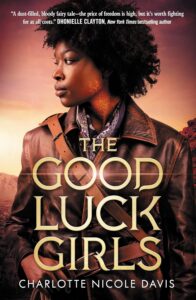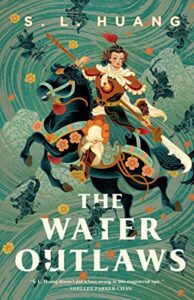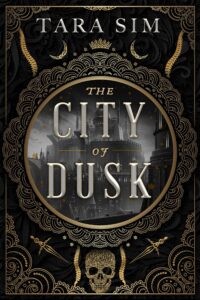Buy this from Bookshop.org to support local bookstores and the Lesbrary!
I am actually going to talk about two books in this review, because while I thought the first book was fantastic, it was not until I finished the sequel that I fully realized exactly how good I thought these books were.
The Good Luck Girls by Charlotte Nicole Davis follows a pair of sisters, Aster and Clementine, as well as a few of their friends as they escape what is known as a welcome house after Clementine accidentally kills a wealthy patron. While the first book is a journey story and the second dives much deeper into the nitty-gritty of revolution, both books are very much fantasy Westerns set in a bleak world inspired by the United States, with heavy themes of justice, inequality, and survival in spite of it all.
Oh boy, did I not expect to love this series as much as I did. I almost didn’t read it at all because even though it is YA, I still feared it would be too bleak for me, the themes of sexual trauma too heavy and too real for me to be able to handle. Fortunately, I decided to give it a shot anyway, because this is a perfect example of why I keep reading YA. I loved all of the characters and their relationships, but more than that, I loved how seriously the book took each of them and their struggles, while also holding them accountable for the ways they hurt people because of it. I loved that it let them be flawed and make mistakes and still deserve love—still deserve better than what the world gives them. And I loved that it let them be angry.
I also appreciated that even though it was YA, it never felt like it was talking down to its readers. These books have a very clear perspective (as they should, and as pretty much every book does), but the author uses the story, rather than the narration, to get that perspective across, which, to me, felt more effective. I don’t want to say too much, but what I will say is of all the YA I’ve read, I think this series engages the most maturely with revolution and oppression, with the hard choices it requires and the ways oppression pits people against each other when they should be on the same side. While it is certainly for and about teenagers, it doesn’t simplify or sugarcoat. It is harsh and it is hard and it is dark, but it is also a fight worth making. For all of that, though, there is an optimism that remains, sometimes dimmer but always there.
I really wish more people would read these books because they are so damn good. They are exactly the kind of books I deserved to have in high school and am grateful current teenagers have now. I can’t wait to see what Charlotte Nicole Davis does next.



